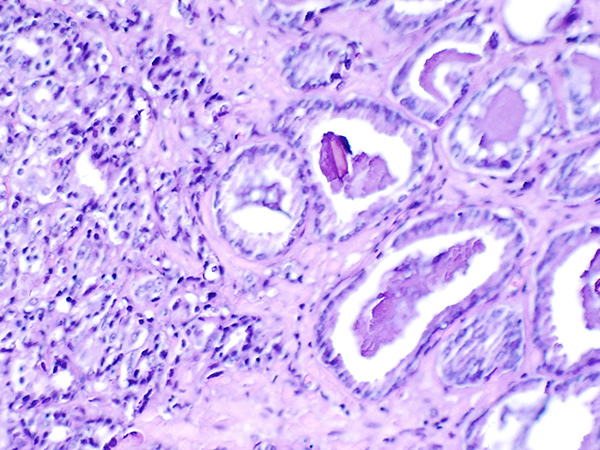Adding a Targeted Treatment Option for Prostate Cancer
The FDA has expanded the use of the PARP-targeted therapeutic olaparib to include the treatment of certain patients with metastatic prostate cancer.

The U.S. Food and Drug Administration (FDA) has expanded the use of the molecularly therapeutic olaparib (Lynparza), which targets ADP-ribose polymerase (PARP) proteins, to include the treatment of certain men who have metastatic prostate cancer.
It is anticipated that 191,930 men in the United States will be diagnosed with prostate cancer in 2020, and that more than 33,000 will die from the disease, according to federal estimates. Most men who die from prostate cancer have metastatic disease. When metastatic prostate cancer stops responding to treatments that target androgens, the hormones that fuel prostate cancer growth, it is referred to as castration-resistant prostate cancer.
Olaparib is intended for men who have metastatic castration-resistant prostate cancer that has progressed despite treatment with enzalutamide (Xtandi) or abiraterone (Zytiga) and that has a mutation in any genes that influence a DNA repair pathway called the homologous recombination repair (HRR) pathway, including BRCA1 and BRCA2 (BRCA1/2).
Cancers caused by mutations in HRR pathway-influencing genes are susceptible to PARP-targeted therapeutics like olaparib, and the molecularly targeted therapeutic was approved by the FDA for treating patients with ovarian cancer caused by BRCA1/2 mutations in December 2014, for treating patients with breast cancer caused by BRCA1/2 mutations in January 2018, and for treating pancreatic cancer caused by BRCA1/2 mutations in December 2019.
Researchers estimate that up to 30 percent of prostate cancers have mutations in HRR pathway- influencing genes, most commonly BRCA1, BRCA2, or ATM.
The approval of olaparib for treating metastatic castration-resistant prostate cancer was based on results from the phase III PROfound clinical trial that were published recently in The New England Journal of Medicine. The data showed that among patients who had prostate cancer with a BRCA1, BRCA2, or ATM mutation, those who received olaparib had median overall survival of 19.1 months compared with 14.7 months among those who received enzalutamide or abiraterone. Progression-free survival was also improved among patients with prostate cancer harboring a BRCA1, BRCA2, or ATM mutation who received olaparib: 7.4 months compared with 3.6 months among those who received enzalutamide or abiraterone.
Olaparib also improved progression-free survival compared with enzalutamide or abiraterone for patients with prostate cancer harboring a mutation in HRR pathway-influencing genes other than BRCA1, BRCA2, or ATM: 5.8 months versus 3.5 months.
The FDA approval was rendered on May 19, 2020.